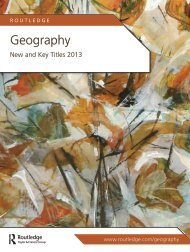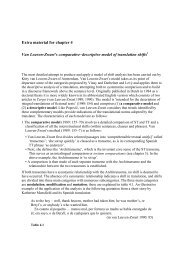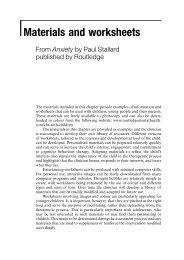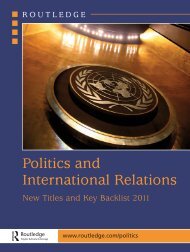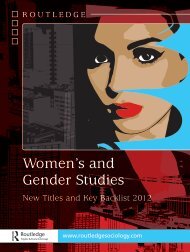Easily na - Routledge
Easily na - Routledge
Easily na - Routledge
Create successful ePaper yourself
Turn your PDF publications into a flip-book with our unique Google optimized e-Paper software.
geNoCide<br />
new<br />
2nd Edition<br />
Genocide<br />
A Comprehensive Introduction<br />
Adam Jones, University of British Columbia<br />
Oka<strong>na</strong>gan, Ca<strong>na</strong>da<br />
Genocide: A Comprehensive<br />
Introduction is the most<br />
wide-ranging textbook on<br />
genocide yet published. The<br />
book is designed as a text for<br />
upper-undergraduate and<br />
graduate students, as well as a<br />
primer for non-specialists and<br />
general readers interested in<br />
learning about one of<br />
humanity’s enduring blights.<br />
Fully updated to reflect the<br />
latest thinking in this rapidly<br />
developing field, this new edition:<br />
• drovides an introduction to genocide as both a<br />
historical phenomenon and an a<strong>na</strong>lytical-legal concept,<br />
including an extended discussion of the concept of<br />
genocidal intent, and the dy<strong>na</strong>mism and contingency<br />
of genocidal processes<br />
• discusses the role of state-building, imperialism, war,<br />
and social revolution in fueling genocide<br />
• supplies a wide range of full-length case studies of<br />
genocides worldwide, each with an accompanying<br />
box-text<br />
• explores perspectives on genocide from the social<br />
sciences, including psychology, sociology,<br />
anthropology, political science/inter<strong>na</strong>tio<strong>na</strong>l relations,<br />
and gender studies<br />
• considers ’The Future of Genocide,’ with attention to<br />
historical memory and genocide denial; initiatives for<br />
truth, justice, and redress; and strategies of<br />
intervention and prevention.<br />
Written in clear and lively prose, liberally sprinkled<br />
with over 100 illustrations and maps, and including<br />
perso<strong>na</strong>l testimonies from genocide survivors, Genocide:<br />
A Comprehensive Introduction has established itself<br />
as the core textbook of the new generation of<br />
genocide scholarship. An accompanying website<br />
(www.genocidetext.net) features a broad selection<br />
of supplementary materials, teaching aids, and<br />
Internet resources.<br />
Selected Contents: Introduction Part 1: Overview 1. The<br />
Origins of Genocide 2. State and Empire;War and Revolution<br />
Part 2: Cases 3. Genocide of Indigenous Peoples 4. The<br />
Ottoman Destruction of Christian Minorities 5. Stalin and<br />
Mao 6. The Jewish Holocaust 7. Cambodia and the Khmer<br />
Rouge 8. Bosnia and Kosovo 9. Apocalypse in Rwanda<br />
Part 3: Social Science Perspectives 10. Psychological<br />
Perspectives 11. The Sociology and Anthropology of<br />
Genocide 12. Political Science and Inter<strong>na</strong>tio<strong>na</strong>l Relations<br />
13. Gendering Genocide Part 4: The Future of Genocide<br />
14. Memory, Forgetting and Denial 15. Justice, Truth and<br />
Redress 16. Strategies of Intervention and Prevention<br />
August 2010: 246 x 174: 656pp<br />
Hb: 978-0-415-48618-7: £80.00<br />
Pb: 978-0-415-48619-4: £24.99<br />
eBook: 978-0-203-84696-4<br />
For more information, visit:<br />
www.routledge.com/9780415486194<br />
Forthcoming in 2011<br />
New Directions in Genocide<br />
Research<br />
Adam Jones, University of British Columbia<br />
Oka<strong>na</strong>gan, Ca<strong>na</strong>da<br />
This edited books seeks to<br />
capture the range of new<br />
approaches, theories and<br />
case studies in the field of<br />
genocide studies. It unfolds<br />
in three sections:<br />
• The first section focuses on<br />
broad theories of comparative<br />
genocide, including a number<br />
of different perspectives.<br />
• The second section critically<br />
reconsiders core themes of genocide studies, including<br />
humanitarian intervention and the role of bystanders;<br />
and unfolds a range of challenging new directions,<br />
including the forcible transfer of children as a<br />
genocidal strategy, cultural genocide, the art and<br />
architecture of genocide, gender and genocide,<br />
structural violence, and the novel application of<br />
remote-sensing technologies to the detection and<br />
study of genocide.<br />
• The third and fi<strong>na</strong>l section is case-study focused,<br />
seeking to place both canonical and little-known cases<br />
of genocide in broader comparative perspective. Cases<br />
a<strong>na</strong>lyzed include genocide in North America, the Nazi<br />
Holocaust, the Rwandan genocide of 1994, and the<br />
Indonesian genocide of 1965-66.<br />
The combi<strong>na</strong>tion of cutting-edge scholarship and<br />
innovative approaches to familiar subjects makes this<br />
essential reading for all students and scholars in the<br />
field of genocide studies.<br />
Selected Contents: Introduction Adam Jones<br />
Part 1: Theories 1. From Definition to Process: The Effects<br />
and Roots of Genocide Benjamin Lieberman 2. Genocidal<br />
Social Practices Daniel Feierstein 3. The Morality of Genocide<br />
Christopher J. Powell Part 2: Themes 4. Cultural Genocide:<br />
Destroying Material Culture, Destroying Identity Pamela De<br />
Condappa 5. Genocidal Masculinities Elisa von Joeden-<br />
Forgey 6. (In)visible Males: A Critical Assessment of UN<br />
Gender Mainstreaming Policies in the Congolese Gendercide<br />
Paula Drumond Rangel Campos 7. Tracking Evidence of the<br />
Genocide through Environmental Change: Applying Remote<br />
Sensing to the Study of Genocide 8. Genocide and<br />
Structural Violence: Charting the Terrain Adam Jones<br />
9. Moral Bystanders and Mass Violence Ernesto Verdeja<br />
Part 3: Cases 10. Revisiting the American Genocide Debate<br />
Benjamin Madley 11. Globalizing Nazi Crimes: A Postcolonial<br />
Reading of the Holocaust Jürgen Zimmerer 12. Colonialism,<br />
Ethnicity and Genocide in the African Great Lakes Region: A<br />
Trans<strong>na</strong>tio<strong>na</strong>l Approach Dominik J. Schaller 13. South Asia<br />
and Genocide: A Case for Prevention Benita Sumita<br />
March 2011: 246 x 174: 240pp<br />
Hb: 978-0-415-49596-7: £75.00<br />
Pb: 978-0-415-49597-4: £22.99<br />
For more information, visit:<br />
www.routledge.com/9780415495974<br />
Browse and order online: www.routledge.com/securitystudies<br />
geNoCide 43<br />
The Inter<strong>na</strong>tio<strong>na</strong>l Politics<br />
of Mass Atrocities<br />
The Case of Darfur<br />
Edited by David R. Black, Dalhousie University,<br />
Ca<strong>na</strong>da and Paul D. Williams, George Washington<br />
University, USA<br />
Series: Security and Gover<strong>na</strong>nce<br />
’This is an excellent volume:<br />
well-conceived, designed,<br />
researched and written;<br />
represents the very best<br />
of case-specific scholarship<br />
on the difficult (issue) of<br />
collective responses to<br />
genocidal conflict; (N)icely<br />
integrates IR theory and<br />
the details of this particular<br />
case. The study blends well<br />
broader concerns such as<br />
the existence and capacity<br />
of an ’inter<strong>na</strong>tio<strong>na</strong>l society’ and the te<strong>na</strong>ciously<br />
problematic case of Darfur. It gives the inter<strong>na</strong>tio<strong>na</strong>l<br />
response to Darfur a clear yardstick and we gain real<br />
insights into the challenges of the context and the<br />
failures of a robust and effective inter<strong>na</strong>tio<strong>na</strong>l<br />
response.’ – Tim Sisk, University of Denver, USA<br />
Selected Contents: Introduction: Inter<strong>na</strong>tio<strong>na</strong>l Society and<br />
the Crisis in Darfur Paul D. Williams and David R. Black<br />
Part 1: Regio<strong>na</strong>l Politics 1. The Government of Sudan<br />
and the Darfurian Armed Groups I.D.F. and Munzoul Assal<br />
2. Regio<strong>na</strong>l Politics and the Darfur Crisis Lee J.M. Seymour<br />
Part 2: Multilateral Politics 3. The United Nations Security<br />
Council Michael MacKinnon 4. The African Union Cristi<strong>na</strong><br />
Badescu and Linnea Bergholm 5. The European Union Rory<br />
Keene and Asbjorn Wee 6. The Inter<strong>na</strong>tio<strong>na</strong>l Crimi<strong>na</strong>l Court<br />
William A. Schabas Part 3: Bilateral Politics 7. The United<br />
States Scott Stedjan and Colin Thomas-Jensen 8. The People’s<br />
Republic of Chi<strong>na</strong> Ian Taylor 9. The United Kingdom Paul D.<br />
Williams 10. France Bruno Charbonneau 11. Ca<strong>na</strong>da David<br />
R. Black. Conclusion David R. Black and Paul D. Williams<br />
January 2010: 234 x 156: 288pp<br />
Hb: 978-0-415-55902-7: £85.00<br />
Pb: 978-0-415-55903-4: £25.99<br />
eBook: 978-0-203-86217-9<br />
For more information, visit:<br />
www.routledge.com/9780415559034<br />
3rd Edition<br />
Century of Genocide<br />
Critical Essays and Eyewitness Accounts<br />
Edited by Samuel Totten, University of Arkansas,<br />
Fayetteville, USA<br />
2008: 229 x 152: 672pp<br />
Hb: 978-0-415-99084-4: £90.00<br />
Pb: 978-0-415-99085-1: £26.99<br />
eBook: 978-0-203-89043-1<br />
For more information, visit:<br />
www.routledge.com/9780415990851



